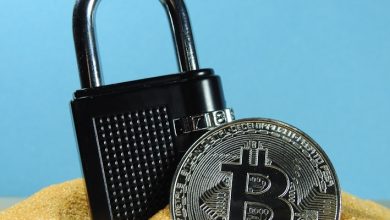The Importance of Security in Crypto: Best Practices for Beginners

- Understanding the Risks of Crypto Investments
- Protecting Your Digital Assets: A Beginner’s Guide
- Common Security Threats in the Crypto World
- The Role of Secure Passwords in Crypto Trading
- Implementing Two-Factor Authentication for Added Security
- Choosing a Secure Wallet for Your Cryptocurrency
Understanding the Risks of Crypto Investments
Investing in cryptocurrency can be lucrative, but it also comes with its fair share of risks. It’s important for beginners to understand these risks before diving into the world of crypto investments. One of the main risks is the high volatility of the market. Cryptocurrency prices can fluctuate dramatically in a short period of time, leading to potential losses for investors.
Another risk to consider is the security of your investments. With the rise of crypto-related scams and hacks, it’s crucial to take measures to protect your digital assets. This includes using secure wallets, enabling two-factor authentication, and being cautious of phishing attempts. By following best security practices, you can minimize the risk of losing your investments to cybercriminals.
Additionally, regulatory risks are something to keep in mind when investing in cryptocurrency. The legal landscape surrounding crypto is still evolving, with different countries imposing various regulations on digital assets. This uncertainty can impact the value of your investments and potentially lead to legal issues down the line. It’s essential to stay informed about the latest regulations and comply with them to avoid any legal complications.
In conclusion, while crypto investments offer exciting opportunities, it’s crucial to be aware of the risks involved. By understanding the volatility of the market, prioritizing security measures, and staying informed about regulatory changes, beginners can navigate the world of cryptocurrency investments more confidently. Remember to always do thorough research and seek advice from experienced investors to make informed decisions and protect your assets.
Protecting Your Digital Assets: A Beginner’s Guide
When it comes to investing in cryptocurrencies, protecting your digital assets is of utmost importance. As a beginner, it’s essential to follow best practices to ensure the security of your investments. Here are some tips to help you safeguard your crypto holdings:
- Use a secure wallet: Choose a reputable cryptocurrency wallet to store your digital assets. Look for wallets that offer two-factor authentication and encryption to protect your funds.
- Keep your private keys safe: Your private keys are like the passwords to your crypto assets. Make sure to store them in a secure location and never share them with anyone.
- Be cautious of phishing scams: Be wary of emails or messages asking for your personal information or login credentials. Always verify the source before providing any sensitive data.
- Enable security features: Take advantage of security features offered by cryptocurrency exchanges, such as email notifications for account activity and withdrawal confirmations.
- Stay informed: Keep yourself updated on the latest security threats and best practices in the crypto space. Join online forums and communities to learn from experienced investors.
By following these simple steps, you can protect your digital assets and minimize the risk of falling victim to cyber attacks. Remember, in the world of cryptocurrencies, security should always be your top priority.
Common Security Threats in the Crypto World
There are several common security threats in the crypto world that every beginner should be aware of. These threats can range from phishing attacks to malware infections, and they can result in the loss of funds or sensitive information. By understanding these risks, crypto users can take the necessary precautions to protect themselves and their assets.
One of the most prevalent security threats in the crypto world is phishing. Phishing attacks involve scammers posing as legitimate entities to trick users into revealing their private keys or passwords. These attacks can occur through email, social media, or even fake websites. It is important to be cautious of unsolicited messages and to verify the authenticity of websites before entering any personal information.
Another common security threat is malware. Malicious software can infect a user’s device and steal their crypto assets or sensitive information. To prevent malware infections, crypto users should only download software from trusted sources and regularly update their antivirus programs. It is also crucial to avoid clicking on suspicious links or downloading attachments from unknown senders.
Additionally, crypto users should be wary of social engineering attacks. These attacks involve manipulating individuals into divulging confidential information or performing actions that compromise their security. To protect against social engineering, users should never share their private keys or passwords with anyone and should always verify the identity of individuals requesting sensitive information.
Overall, understanding the common security threats in the crypto world is essential for beginners to safeguard their assets. By staying vigilant and implementing best security practices, crypto users can mitigate the risks associated with these threats and enjoy a safer experience in the digital asset space.
The Role of Secure Passwords in Crypto Trading
Ensuring the security of your passwords is crucial when engaging in crypto trading. Strong and secure passwords are your first line of defense against unauthorized access to your accounts and funds. When creating a password for your crypto trading accounts, it’s important to follow best practices to minimize the risk of hacking and theft.
First and foremost, avoid using easily guessable passwords such as “123456” or “password”. Instead, opt for a combination of letters (both uppercase and lowercase), numbers, and special characters. A good practice is to create a passphrase that is long and complex, making it difficult for attackers to crack.
Furthermore, it’s essential to use unique passwords for each of your crypto trading accounts. Reusing passwords across multiple platforms increases the risk of a security breach. Consider using a password manager to securely store and manage your passwords.
Regularly updating your passwords is also crucial to maintain the security of your accounts. Set a reminder to change your passwords every few months to reduce the risk of unauthorized access. Additionally, enable two-factor authentication (2FA) whenever possible for an extra layer of security.
By implementing these best practices and prioritizing the security of your passwords, you can minimize the risk of falling victim to cyber attacks and safeguard your crypto assets. Remember, a strong password is your first line of defense in the world of crypto trading.
Implementing Two-Factor Authentication for Added Security
One of the best practices for enhancing security in the world of cryptocurrency is implementing two-factor authentication (2FA). This extra layer of security adds an additional step to the login process, making it more difficult for unauthorized users to gain access to your account.
When setting up 2FA, you typically have the option to receive a code via text message, email, or through an authenticator app on your smartphone. This code is required in addition to your regular password when logging in to your account.
By utilizing 2FA, you significantly reduce the risk of unauthorized access to your cryptocurrency accounts, even if your password is compromised. Hackers would not only need to obtain your password but also have access to your phone or email to successfully log in to your account.
Choosing a Secure Wallet for Your Cryptocurrency
When it comes to storing your cryptocurrency, choosing a secure wallet is crucial to ensuring the safety of your digital assets. There are various types of wallets available in the market, each with its own level of security features. It is important to select a wallet that offers robust security measures to protect against potential threats such as hacking and theft.
One of the most secure options for storing cryptocurrency is a hardware wallet. Hardware wallets are physical devices that store your private keys offline, making it nearly impossible for hackers to access your funds remotely. These wallets typically require a PIN code or password to authorize transactions, adding an extra layer of security.
Another secure option is a paper wallet, which involves printing out your private keys and storing them in a secure location. While paper wallets are not as convenient as hardware wallets, they are highly secure as they are not connected to the internet, minimizing the risk of cyber attacks.
For those who prefer a more convenient option, a mobile or desktop wallet can be a good choice. However, it is important to choose a wallet from a reputable provider that has a strong track record of security. Look for wallets that offer features such as two-factor authentication and encryption to protect your funds.
Regardless of the type of wallet you choose, it is essential to follow best practices for securing your cryptocurrency. This includes regularly updating your wallet software, enabling security features such as PIN protection, and keeping your private keys confidential. By taking these precautions, you can minimize the risk of unauthorized access to your funds and ensure the security of your cryptocurrency investments.



